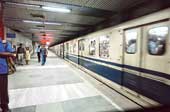 |
| Mechanical faults often result in underground trains getting stuck in the tunnel or moving with half lights and fans not functioning |
Metro Railway’s operations might have improved over the past six months but the city’s fastest mass transit system is still teetering on the edge with some key components in at least seven ageing rakes frequently developing snags.
A number of motor alternators and compressors, two key components of a rake, often break down and crucial parts fall off the underbelly, leading to delays in the running of trains.
The motor alternator supplies power to the fans and lights of the train while the compressor helps regulate the braking system and the movement of doors.
Each unit of four coaches — a rake has eight coaches — has a pair of motor alternators and compressors.
If a motor regulator breaks down, a train has to run with many of its fans and lights not functioning. And if a compressor breaks down, the rake may get stuck in the tunnel.
“Ideally, a train should be withdrawn if one of the component breaks down. But because of shortage of rakes we have to keep running a snag-hit train instead of repairing the faulty components,” said a Metro official.
“Often several parts of a train hang loosely from the underbelly,” said another official. Last week, two trains were stuck at Kavi Subhash (New Garia) station — one was about to leave and the other had just arrived — with the problem during the evening rush hour.
“The axle lock of one of the rakes and the motor alternator frame of the other had come loose. Both were withdrawn from commercial operations and taken to Noapara and Tollygunge maintenance sheds for repairs,” said the official.
Nearly half of Metro’s 160 coaches have either outlived their “running time” or are nearing the end and should have been condemned by now.
Metro had early last year sought permission from the railway ministry to run the 24 coaches that had crossed their 25-year “running time” and another 60 that were about to do so. The permission was granted.
Around 80 of the 160 coaches have been in service since the first train rolled out of Esplanade in 1984.
Of the 18 non-AC rakes run by Metro, 11 will be phased out gradually while seven will undergo overhauling.
“We have to wait for all 18 air-conditioned rakes to arrive before we can start the phase-out process by March 2012, we have to increase the number of trips from 236 to 270 everyday,” said Protyush Ghosh, the spokesperson for Metro.
Two AC rakes are already running while three more are expected by July.
“Once we get these three rakes, seven old rakes will be rehabilitated,” said the spokesperson.
All the new rakes are expected to join the Metro fleet by March 2012, he said.










